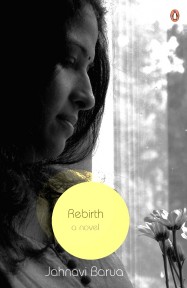 Author Jahnavi Barua does not carry the burden of history though her writing easily, without making a ceremony of it, touches its frayed seams, its tautly pulsing, raw nerves. There is no attempt to rub the reader’s nose in the politics of the North-East, a region she is deeply connected to because she grew up there. Instead she creates stories and characters with the stuff of every day life and places them in the context of a political reality that must be acknowledged. Her books are not mission statements but slices of life, deeply felt, intensely lived.
Author Jahnavi Barua does not carry the burden of history though her writing easily, without making a ceremony of it, touches its frayed seams, its tautly pulsing, raw nerves. There is no attempt to rub the reader’s nose in the politics of the North-East, a region she is deeply connected to because she grew up there. Instead she creates stories and characters with the stuff of every day life and places them in the context of a political reality that must be acknowledged. Her books are not mission statements but slices of life, deeply felt, intensely lived.
Her novel ‘Rebirth,’ slated to be launched on March 12 in Bangalore negotiates the personal stories of its protagonists even as it recreates the unobtrusive but unmistakable presence of Assam. Barua’s writing is like her. Insightful, deeply human, keenly observant, warm, devoid of huff and bluster. And her new book connects us to the many-layered life of young Kaberi as she tries to make sense of her difficult emotional life and grapples with the truth of her marriage, the uneasy bond with her parents and a devastating loss.
‘Next Door,’ her first book of short stories was acclaimed for a sense of atmosphere and her novel too is visually rich and evocative at many levels, both palpable and subliminal.
In a chat with Unboxed Writers, Barua discusses her novel and how it was birthed…
A novel after a book of short stories..how is the process different? Do you disconnect from a character after a short story is done and carry a character, nurse it, live with it when you are writing a novel?
Writing the book required a different kind of discipline- while the short fiction required that I say as little as possible, yet making every word and image count, the novel compelled me to say much more without saying too much. I carry all my characters, from both the short stories and the novel, around with me! I always feel connected, like one does to one’s offspring.
Also how is the political reality of your birth state charging your fiction..is it integral to how you think of a story or a character?
As I have said before, the political situation in my state, informs my writing to only that same degree to which it informs the daily lives of normal people there. It is always there, in the background, but I have not written an overtly political piece yet.
What was the trigger point of the book? Do you write in a linear manner or do the chapters jump back and forth with you writing compulsively what comes to you first?
I don’t know if there was a trigger point- my writing kind of meanders, or it seems to, for every diversion actually has a significance!
What has been the most painful and the most satisfying thing about writing this book?
Fortunately, there was nothing painful about writing this book, except that I always have too little time to write……the most satisfying thing was when I succeeded in achieving that exact atmosphere of the protagonist’s world. A very interior and contemplative world.
 What is the process of writing like for you? Do you isolate yourself or have to surface and connect with life outside of the book to refresh yourself?
What is the process of writing like for you? Do you isolate yourself or have to surface and connect with life outside of the book to refresh yourself?
There is little chance of totally isolating oneself from the world, one has responsibilities, children etc, but I do need long periods of isolation . Something difficult, for anyone other than a fellow writer, to understand.
Who is your ideal reader?
Someone who is able to read between the lines.
What kind of a resolution do you hope to see in the North East? Do you think writing about it is your way of telling the world that another reality too exists?
I hope to see peace return and that seems possible, this year especially. But more importantly, I would like to see robust economic development, for that is the only way to ensure and secure long-term peace.
My writing seeks to inform people about other people, not necessarily, from one particular place





